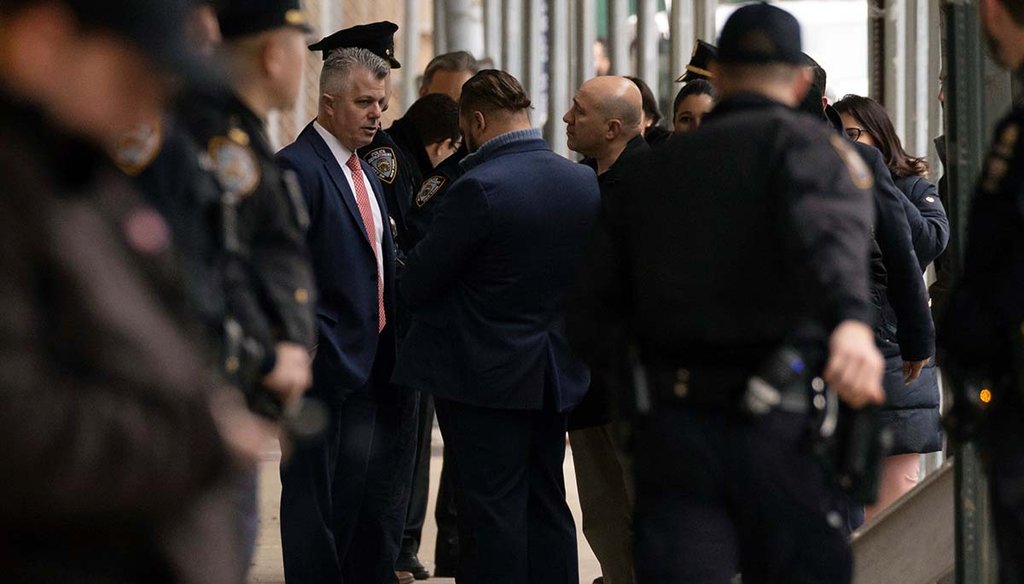Stand up for the facts!
Our only agenda is to publish the truth so you can be an informed participant in democracy.
We need your help.
I would like to contribute

Law enforcement personnel confer March 31, 2023, outside Manhattan Criminal Court in New York. (AP)
Donald Trump is expected to appear in a New York courtroom April 4 to be arraigned after a grand jury indictment in the Stormy Daniels hush money case.
Although the criminal prosecution of a former U.S. president is historic, it’s also wrapped up in legalese that can be confusing if you’re not a lawyer — or a "Law & Order" fan.
If you need a refresher on what grand juries are, what happens at an arraignment and how we got to this point, read this guide.
What is an indictment?
An indictment is one way to bring charges against someone suspected of a crime.
Charges can be brought forward in criminal cases in one of three ways: through an indictment by a grand jury, a filing directly by a prosecutor or a police officer can make a probable cause arrest, said Kendall Coffey, a former U.S Attorney in Miami now in private practice.
An indictment is a statement of charges. An indictment alone does not mean a defendant is guilty.
A prosecutor may pursue charges through a grand jury in high-profile cases so it does not appear as if the prosecutor acted alone, Coffey said.
What is a grand jury?
Grand juries consist of local citizens and are convened the same way as trial juries, except they must agree to be available for at least two weeks, and often for months.
Grand juries meet in secret to allow witnesses to testify freely and avoid any interference for jurors. A New York grand jury has 23 members. To conduct any business, at least 16 grand jurors must be present.
The grand jury is part of the prosecutor’s investigative process, and lets prosecutors test their evidence and get a reaction.
"A grand jury does not decide whether or not a person has been proven guilty," states New York’s grand juror’s handbook. "That is the trial jury’s job. The grand jury decides whether or not a person should be formally charged with a crime or other offense."
Only the prosecution presents evidence to the grand jury. A defense attorney is present only if the accused person chooses to testify. News reports said Trump was invited to testify but didn’t.
Why was a grand jury used in Trump’s hush money case?
In New York state, people cannot be brought to trial for a felony unless they have been indicted by a grand jury.
"The grand jury has an awesome responsibility," states the New York handbook. "It uses its power both as a sword and as a shield: a sword to accuse or indict those whom there is reason to believe have committed crimes; a shield to protect the innocent against unfounded accusations."
Randy Zelin, a law professor at Cornell University and a New York trial lawyer, said grand juries are intended as a check on the government’s power. In some states, he said, a judge will make the determination about whether a case can move on to trial.
What does someone on a grand jury do?
Grand jurors may ask questions about the law and questions of witnesses about the evidence. Generally, the prosecutor reviews grand jurors’ questions for witnesses and permits only those that are relevant and legally proper, according to the handbook.
The grand jury may vote to formally accuse someone of a crime by issuing an indictment, or may vote to dismiss the charges. The grand jury may also direct the prosecutor to proceed on a path that would result in a charge that is less than a felony.
Why isn’t the indictment public?
The indictment remained sealed because the proceedings were still considered private and charges had not yet been made public.
The indictment will be unsealed by the time Trump is arraigned.
What is an arraignment?
Trump is expected to surrender and attend an arraignment at the Lower Manhattan’s Criminal Courts Building, where he will be protected by Secret Service agents.
An arraignment is typically a short hearing — sometimes lasting only minutes — in which charges are unsealed, if they haven’t been already.
Trump would be expected to enter a not guilty plea and request a jury trial.
Trump will need to be booked and fingerprinted, but one of Trump’s lawyers, Joe Tacopina, told ABC, "The president will not be put in handcuffs."
Trump’s defense attorney and prosecutors will likely have worked out an agreement on pretrial release conditions before the hearing.
Zelin said that because of bail reforms in New York, the judge would lack discretion to set bail and Trump would be free to leave on his own recognizance after the hearing. In New York, Zelin said, only certain offenses qualify for bail and this would not be among them.
Has a president ever been indicted?
Before Trump, no American president has been indicted on criminal charges either while in office or after leaving the White House.
American presidents have been investigated by special counsels for conduct while in office, including Richard Nixon, Bill Clinton and Trump. But a pair of federal legal opinions are widely interpreted as protecting sitting presidents from prosecution.
What has Trump said about this case?
Trump has consistently denied an affair with Stormy Daniels, an adult film actor whose real name is Stephanie Clifford. But he changed his story around the $130,000 payment for her silence before the 2016 election. Trump said in April 2018 that he had no knowledge about the payment to Daniels. But a month later, Trump said his lawyer Michael Cohen was on a monthly retainer and with that retainer money, Cohen entered an agreement to pay Daniels
After the grand jury indicted Trump, he issued a statement calling his case "political persecution and election interference at the highest level in history."
Why was Trump charged in the Stormy Daniels case first?
The Stormy Daniels payment investigation is one of multiple investigations of Trump.
He is under investigation by Fulton County, Georgia, prosecutors for his role in trying to overturn the 2020 election results. That prosecutor, Fani Willis, told a Georgia judge in January that charging "decisions are imminent" but exactly when is unknown.
Federal prosecutors are investigating two separate cases involving Trump. Attorney General Merrick Garland assigned a special counsel to investigate Trump for removing documents from the White House when he left the presidency. Federal prosecutors are also investigating Trump’s actions leading up to the Jan. 6, 2021, attack on the U.S. Capitol by Trump supporters.
The case involving Stormy Daniels could be simpler than some of these other prosecutions. In the Jan. 6 case, prosecutors are likely sifting through an enormous amount of testimony and evidence.
The cases in Manhattan, Georgia and Washington, D.C., also involve different jurisdictions and prosecutors, as well as some different statutes. Nothing stops a local district attorney from proceeding while the Justice Department continues federal investigations.
"The prosecutors’ offices might say if this case is ready we don’t have to wait for the feds," Coffey said.
RELATED: Timeline: What Donald Trump has said about Stormy Daniels and $130,000 payment
RELATED: Trump’s attacks on Manhattan DA Alvin Bragg’s backing by George Soros: What to know
RELATED: Q&A: Can Trump run for president if indicted in Stormy Daniels case? What happens if he's arrested?
RELATED: All of our fact-checks of Trump on the Truth-O-Meter
Our Sources
ABC News, tweet, March 31, 2023
Telephone interview, Kendall Coffey, former U.S. Attorney in Miami and lawyer at Coffey Burlington, March 31, 2023
Telephone interview, Randy Zelin, a law professor at Cornell University and a New York trial lawyer, March 31, 2023
The Associated Press, "Trump to be arraigned Tuesday to face hush money indictment," March 31, 2023
U.S. Department of Justice, "A sitting president's amenability to indictment and criminal prosecution," Oct. 16, 2000
U.S. Department of Justice, "Amenability of the president, vice president and other civil officers to federal criminal prosecution while in office," Sept. 24, 1973
Gerald R. Ford Presidential Library and Museum, "Nixon pardon"
U.S. Department of Justice, "Report On The Investigation Into Russian Interference In The 2016 Presidential Election," March 2019
The Washington Post, "In a Deal, Clinton Avoids Indictment," Jan. 20, 2001
The New York Times, "Exiting Job, Clinton Accepts Immunity Deal," Jan. 20, 2001
New York State Unified Court System, Grand juror’s handbook, February 2017




























